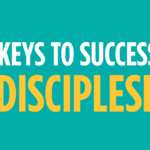Action over intention.
Over the last year or so, there has been a focus on increasing diversity and inclusion. This is not limited to culture alone, and is something we should be working toward in our ministries, as well. In fact, the body of Christ should be quick to do the work to ensure that our ministries are striving toward “on Earth as it is in heaven.” We must not be dismissive of this work, nor passive about it. It is not enough to desire a diverse ministry. It is something we have to take intentional, actionable steps toward, and that begins with our own attitude toward it.
I was encouraged and challenged in this myself during this week’s podcast episode with Chris Bacon, lead student pastor at First Baptist Church Orlando. Chris has been deeply involved in the work of leading a diverse and inclusive ministry that matches the demographic of Orlando, Florida. But this didn’t happen by accident or coincidence. Chris and the other leaders at FBC Orlando are building a ministry culture that is intentional about asking questions, listening even when the answers aren’t what they expect, making changes that promote inclusion, and seeking out voices and experiences that direct the work they are doing.
This is your work, too.
You might be tempted to assume that building a diverse ministry in a diverse metropolitan area is “easier” than a suburban or rural community. I want to challenge you to re-think that mindset and consider ways you can begin striving for more diversity. Your ministry may not look like Chris’, but it should reflect the unique community that you are part of.
If you aren’t exactly sure what the demographics of your city are, it’s time to become a student of your own community. Seek out voices, organizations, and information about where you live, and remember: be intentional and humble in this work.
Here are three ways to challenge your own mindset about diversity:
1. Diversity is not just about race.
When we hear the term “diversity,” our minds immediately jump to racial diversity. And while that is crucial, we cannot let it be the only definition. The Kingdom of God is made up of people from diverse cultural backgrounds, neighborhoods, income levels, educational backgrounds, abilities and disabilities, family structures, and genders. As you consider diversity, remember that the goal is for your ministry to mirror the wide range of diversity represented in your community.
2. Diversity should start with your leadership team.
Recruiting and training leaders is a large part of your responsibility as a student pastor. I understand the challenges that lie within that task alone, and I understand the defeat that might accompany the ask I’m about to make of you, but it is crucial. Student pastor, your volunteer leader team should reflect the diversity of your community, too. Teenagers need to see adults who look and sound like them on stage, in Zoom rooms, leading small groups, and at their extracurricular events. This sends the message that not only are students from different backgrounds welcome in your ministry, but that there is a place for them in the Kingdom.
3. There’s a difference between diversity and inclusion.
Much like our overall ministry measures should be engagement and relationships over numbers, our measure of diversity should not merely be diversity for the sake of diversity, but inclusion. Do the programs and practices of your ministry honor and celebrate the backgrounds of the teenagers who make up your ministry? Are there small changes you can make to programming time, location, language, etc. that might make certain people feel more included and like they belong? I want to give the caveat here that you cannot and will not be able to accommodate everyone within your ministry, and that is okay. But, there are certainly changes that can be made along the way to ensure that your ministry practices are not hindering relationships with students because they are unintentionally exclusive. When a student feels a sense of belonging in your ministry, they can begin to understand how they belong inside the Kingdom through the grace of Jesus.
Diversity is not a checklist item.
I love accomplishing a task. There’s something so fulfilling about checking something off a list and moving on to the next thing that needs my attention. But here’s my challenge to you and to myself: the work of building a more diverse and inclusive ministry will never be over. May we never be tempted to cross “diversity” off our list and consider it accomplished. In striving for diversity and inclusion, we will make mistakes along the way, but we must not let our own defeat keep us from doing this Kingdom-expanding work.
This post was written by Ben Trueblood, Director of Lifeway Students. Ben is passionate about investing in student ministry leaders like you. You can find more encouragement from Ben on his YouTube Channel, Student Ministry That Matters.




